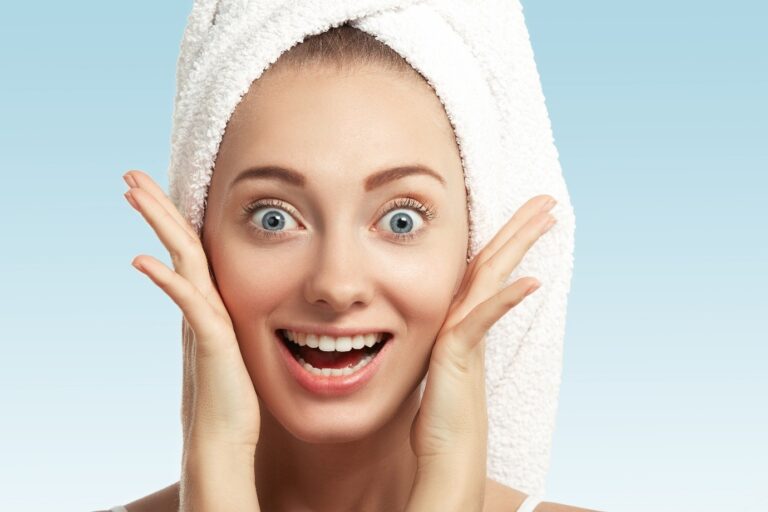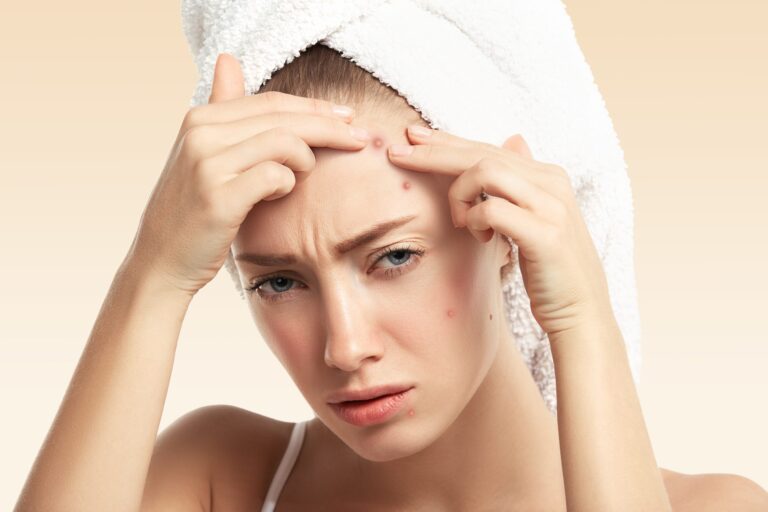Get insight into what acne is, the areas of your face and body where it can appear, and various treatments that can help. BeautyBorn MedSpa will help you choose which treatments are best for you!
Do you ever feel like acne won’t seem to go away no matter how hard you try? Are the small bumps and red spots on your face making you feel self-conscious and frustrated? If so, don’t worry. You are not alone. Acne continues to be one of the top skin concerns for millions worldwide. They are looking for effective ways to treat and prevent it.
Let’s explore what causes acne, discuss different treatment options, and provide helpful tips for preventing acne breakouts from keeping your skin looking and feeling youthful, radiant and healthy!
What is Acne
Acne is a skin ailment that affects millions of individuals throughout the world. It is characterized by pimples, blackheads, whiteheads, and, sometimes, painful cysts. Acne typically affects the face (Acne on forehead, acne around mouth, acne on nose, acne on cheeks, acne on chin, acne on jawline), neck, chest, and back. While it is common among teenagers due to hormonal changes, acne can occur at any age.
Acne forms when hair follicles get plugged with dead skin cells, bacteria, and a surplus of sebum, an oily fluid that lubricates skin and hair. As a result, pimples, blackheads, whiteheads, and cystic acne appear. This results in pimples, blackheads, whiteheads, and cystic acne. Acne can cause physical and emotional discomfort, leading to low self-esteem and depression. Let’s dive into the causes of acne and the treatment options available.
Causes of Acne
Acne is an outbreak of spots found on any part of the body, with the majority located on the face, forehead, cheeks, chin, jawline, and around the mouth. These spots appear as whiteheads, blackheads, pimples or bumps. Acne occurs when oil glands become blocked and inflamed due to a buildup of surface oil, dirt and bacteria under the skin. Hormonal changes in teens or women undergoing menopause are also known to cause breakouts; also, it is caused by genetics, certain medications, stress, and diet. Let’s take a closer look at various factors causing acne;
Hormonal changes
One of the key reasons for acne, particularly in teens and women, is hormonal fluctuations. Hormones are chemicals produced by the body and affect different organs and tissues. The hormones most commonly involved in acne are androgens, such as testosterone. Androgens are found in males and females, although males have a larger concentration. Androgens play an important role in the development of male sexual characteristics. Still, they also stimulate the oil glands in the skin, which can lead to acne.
When androgen levels are high, the sebaceous glands are stimulated to create more sebum. This oily material moisturizes the skin. Still, when too much is produced, it can clog the pores, leading to the development of acne.
In addition to androgens, other hormones can also contribute to acne. For example, estrogen levels can affect sebum production, and changes in estrogen levels during the menstrual cycle can lead to breakouts. Similarly, cortisol, a stress hormone, can cause the sebaceous glands to produce more oil, leading to acne.
Genetics
Acne breakouts are common, and genetics can affect your acne risk. It can come in acne on the face, forehead, chin, and mouth. Regular skin care is key to minimizing its visibility. While it often starts during puberty due to the body’s changing hormones, genetics can also be responsible for causing flare-ups at any age.
Since some genes increase sebum production or make skin cells stick together more easily, guidelines on skincare near me may have an added complexity depending on each person’s genetics.
Diet
Acne treatment often requires identifying and managing environmental factors contributing to breakouts, such as diet and lifestyle choices. A diet high in refined carbs added sugars, and dairy products can increase acne risk.
Stress
Stress can be an unfortunate side effect of our fast-paced, modern lifestyle. It may cause us to lose sleep and our appetite or even suffer from anxiety – but it can also have a direct and tangible impact on our skin in the form of acne flare-ups. While there are many potential skincare solutions, consulting with a dermatologist is often the best approach when stress has caused your complexion to be less than perfect.
Whether you’re seeking more information on acne laser treatments or local skin clinics that offer specialized acne treatment, finding an experienced professional nearby can help break the cycle of stress and reestablish balance in your skin for long-term results.
Medications
Certain medications, such as steroids prescribed by doctors, can also contribute to this problem. Acne lesions may appear on the face, forehead, chin, cheeks, or jawline – any of these areas can be affected by medications that increase oil production in the skin.
Knowing the cause of one’s acne is important to find a suitable solution to it; if you’re taking a medication known to cause breakouts and believe it might be responsible for your acne, search for good skin care near me or acne treatment near me, about other acne treatment options.
The causes of acne are multifactorial and can vary depending on the individual. Let’s dive into reasons for acne on various facial areas, including the forehead, nose, jawline, chin, and around the mouth.
Acne on the face
Acne on the face is common due to various factors, including genetics, hormonal changes, and environmental factors. The look is one of the most exposed areas of the skin and is therefore prone to acne. Acne on the face can present in various forms, including blackheads, whiteheads, papules, pustules, cysts, and nodules.
Acne on the forehead
The forehead is an area of the skin prone to excess oil production, which can clog the pores and cause acne. Additionally, wearing hats, using hair products, and touching the forehead frequently can contribute to the development of acne on the forehead.
Acne on the nose
The nose is an area of the skin prone to excess oil production, which can clog the pores and cause acne. Additionally, the nose is an area of the skin frequently touched, which can transfer bacteria to the skin and cause acne.
Acne on the jawline
Acne on the jawline is a common acne affecting both men and women. Acne on the jawline is often more difficult to treat than other areas of the face, and several factors can cause it.
Acne is a skin condition that occurs when hair follicles become clogged with oil and dead skin cells, forming pimples, blackheads, and whiteheads. Acne on the jawline typically appears as small, red, and inflamed bumps.
One of the most common causes of acne on the jawline is hormonal changes. Hormones such as androgens can stimulate the sebaceous glands in the skin, increasing oil production. This excess oil can clog hair follicles, leading to the development of acne.
Acne around the mouth
Acne around the mouth is a common type of acne that various factors can cause. Acne around the mouth typically appears as small, red, inflamed bumps or pimples.
One possible cause of acne around the mouth is hormonal changes. Hormonal fluctuations, such as those that occur during the menstrual cycle, can stimulate the sebaceous glands in the skin, leading to an increase in oil production. This excess oil can clog hair follicles, leading to the development of acne.
Another possible cause of acne around the mouth is poor oral hygiene. Bacteria from the mouth can spread to the skin around the mouth, leading to the formation of acne. It is important to brush and floss regularly and to avoid touching your face with your hands to prevent the spread of bacteria.
In addition, certain foods may also contribute to the development of acne around the mouth. Foods high in sugar or refined carbohydrates, such as white bread or candy, can cause spikes in blood sugar levels, triggering an increase in oil production and the development of acne.
To treat acne around the mouth, it is important to maintain good oral hygiene, avoid touching your face with your hands, and eat a healthy diet low in sugar and refined carbohydrates. If acne persists, consider seeing a dermatologist who can recommend prescription treatments such as topical or oral medications.
In conclusion, acne on the face, including the forehead, nose, jawline, chin, and mouth, can occur for various reasons. Understanding the underlying causes of acne can help individuals manage their condition effectively. If acne is severe or persistent, it is recommended to seek medical advice from a dermatologist.
Types of Acne
Acne can be classified into different types based on its severity and symptoms. These include mild acne characterized by blackheads and whiteheads and a few pimples. Similarly, Moderate acne is expressed by pimples, blackheads, whiteheads, and inflammatory papules and pustules.
Severe acne is characterized by multiple pimples, cysts, and nodules, which can cause significant scarring. Medically acne is divided into the following types listed as under;
Acne vulgaris: This is the most common type of acne, characterized by pimples, blackheads, and whiteheads that occur on the face, neck, chest, and back. Acne vulgaris is caused by a combination of factors, including excess sebum production, bacteria, inflammation, and hormonal imbalances.
Cystic acne: This type of acne is characterized by large, painful cysts that develop deep beneath the skin’s surface. Various factors, including hormonal imbalances, genetics, and certain medications, can cause cystic acne.
Nodular acne: Nodular acne resembles cystic acne, but the lesions are typically smaller and less painful. However, they can still be deep beneath the skin’s surface and difficult to treat.
Acne conglobata: This is a severe form of acne characterized by deep, inflamed nodules and abscesses that can leave scars. It typically occurs in males and is often associated with hormonal imbalances.
Acne fulminans: This rare and severe acne typically affects adolescent males. The sudden onset of painful, inflammatory nodules and ulcerations characterizes it. It may be accompanied by fever and joint pain.
Acne mechanica: Acne mechanica is caused by friction, pressure, or skin rubbing, often due to wearing tight clothing or gear or excessive sweating. It typically occurs in athletes or people who wear tight-fitting clothing for extended periods.
Acne cosmetica: This type of acne is caused by using certain cosmetic products that clog the pores. It typically occurs on the forehead and cheeks and is more common in women than men.
Treatment of Acne
Acne can be an annoying and often embarrassing problem to have, but there are many treatments available. At-home skin care is one option – facial treatments like daily exfoliation, spot treatments with salicylic acid or benzoyl peroxide, and non-comedogenic moisturizers can help manage acne on the face or acne on the nose.
Another route is to find skincare near me or acne treatment near me for specialized services such as chemical peels, cleansing facials, and acne laser treatment. Treating breakouts with laser beams can reduce pimples quickly and effectively by destroying the bacteria deep within pores and improving skin texture. We have many options to help improve and treat acne at BeautyBorn MedSpa.
With so many available treatments out there, it’s important to explore all the options to help with your specific case of acne. If over-the-counter or home remedies don’t work well enough or fast enough, seeking dermatological assistance or laser treatment may be necessary. You can also ask your healthcare professional if any other medications work better based on your needs.
The bottom line is that acne doesn’t have to stick around and affect your life. Do some research and find a treatment that works best for you! If you need help finding the right skincare near you, feel free to reach out for personalized assistance and ensure you get the service you deserve.
In conclusion, addressing your acne can be challenging, but there are many ways to combat it using available treatments. Whether over-the-counter side effects or finding a skin clinic near me offering laser treatment, no one should give up searching for solutions when dealing with this skin condition. So don’t hesitate: to take action today and start feeling more confident about the skin you’re in!







